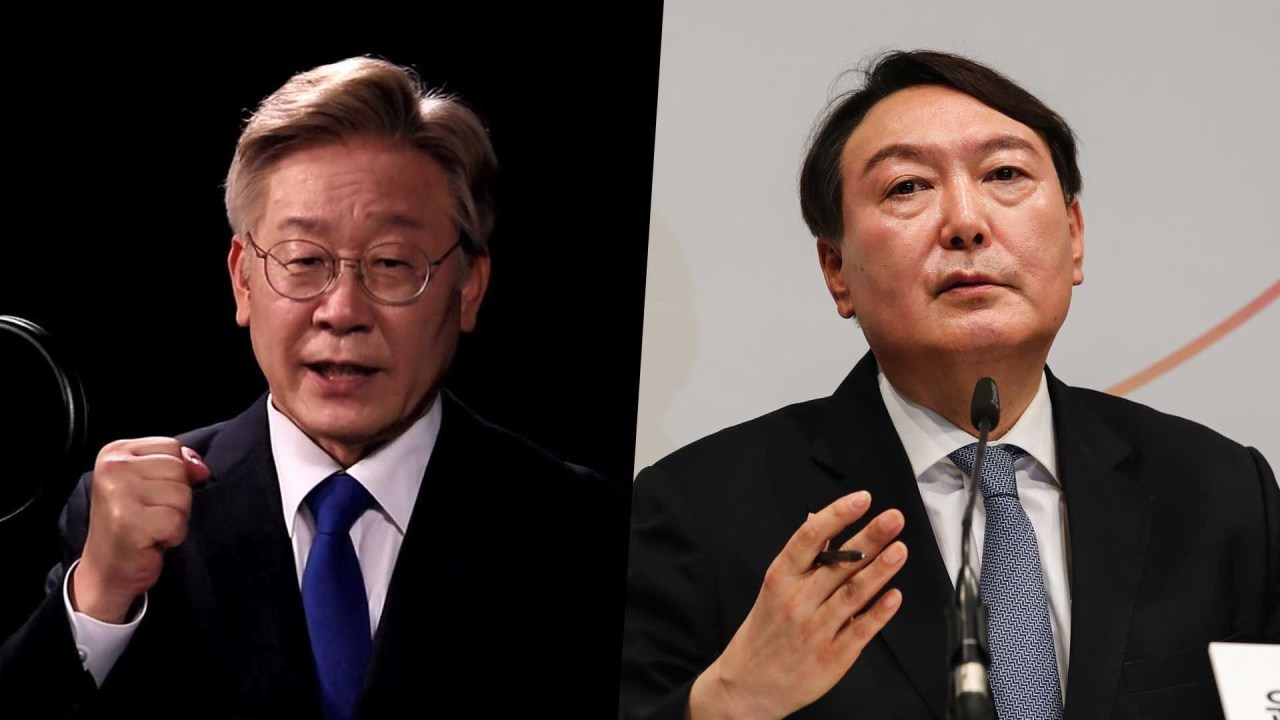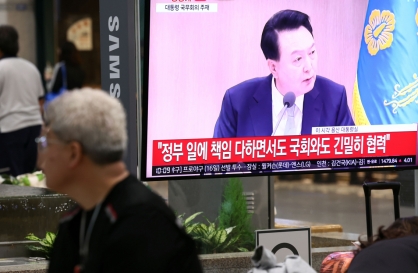Ex-top prosecutor Yoon ahead of Gyeonggi Gov. Lee in latest polls
By YonhapPublished : July 6, 2021 - 09:11

Former Prosecutor General Yoon Seok-youl maintained his lead over Gyeonggi Province Gov. Lee Jae-myung in two polls on presidential hopefuls released Monday.
In a Realmeter survey conducted over the weekend, Yoon came out on top with 33.9 percent of support, with Lee trailing at 26.3 percent. Former Prime Minister Lee Nak-yon was a distant third at 12.5 percent, with others who have thrown their hats into the ring only garnering single digits of support.
Realmeter polled 1,015 South Koreans aged 18 and older. Its poll had a margin of error of 3.1 percentage points, with a 95 percent confidence level.
In a hypothetical one-on-one duel, Yoon led Lee Jae-myung 43.6 percent to 39.4 percent.
In a separate poll by the Korea Society Opinion Institute (KSOI), whose results were released earlier Monday, Yoon led the way with 31.4 percent support. Gov. Lee was right behind him at 30.3 percent.
The KSOI polled 1,002 people aged 18 or order from last Friday to Saturday. Lee Nak-yon was the only other hopeful to reach double figures with 12.2 percent support. The KSOI survey also had a 95 percent confidence level and a margin of error of 3.1 percentage points.
Realmeter also asked participants about how they would evaluate candidacies for Yoon and Gov. Lee.
For Yoon, 28.8 percent of the surveyed said they were most interested in his performance in public service, followed by 21.3 percent who said they would look into Yoon's family and his personal life.
In comparison, 31.1 percent said they will judge Lee based on his performance in the public sector, while 16.8 percent said they would study his ideological leanings. (Yonhap)
In a Realmeter survey conducted over the weekend, Yoon came out on top with 33.9 percent of support, with Lee trailing at 26.3 percent. Former Prime Minister Lee Nak-yon was a distant third at 12.5 percent, with others who have thrown their hats into the ring only garnering single digits of support.
Realmeter polled 1,015 South Koreans aged 18 and older. Its poll had a margin of error of 3.1 percentage points, with a 95 percent confidence level.
In a hypothetical one-on-one duel, Yoon led Lee Jae-myung 43.6 percent to 39.4 percent.
In a separate poll by the Korea Society Opinion Institute (KSOI), whose results were released earlier Monday, Yoon led the way with 31.4 percent support. Gov. Lee was right behind him at 30.3 percent.
The KSOI polled 1,002 people aged 18 or order from last Friday to Saturday. Lee Nak-yon was the only other hopeful to reach double figures with 12.2 percent support. The KSOI survey also had a 95 percent confidence level and a margin of error of 3.1 percentage points.
Realmeter also asked participants about how they would evaluate candidacies for Yoon and Gov. Lee.
For Yoon, 28.8 percent of the surveyed said they were most interested in his performance in public service, followed by 21.3 percent who said they would look into Yoon's family and his personal life.
In comparison, 31.1 percent said they will judge Lee based on his performance in the public sector, while 16.8 percent said they would study his ideological leanings. (Yonhap)







![[From the Scene] Monks, Buddhists hail return of remains of Buddhas](http://res.heraldm.com/phpwas/restmb_idxmake.php?idx=644&simg=/content/image/2024/04/19/20240419050617_0.jpg&u=20240419175937)








![[From the Scene] Monks, Buddhists hail return of remains of Buddhas](http://res.heraldm.com/phpwas/restmb_idxmake.php?idx=652&simg=/content/image/2024/04/19/20240419050617_0.jpg&u=20240419175937)

![[KH Explains] Hyundai's full hybrid edge to pay off amid slow transition to pure EVs](http://res.heraldm.com/phpwas/restmb_idxmake.php?idx=652&simg=/content/image/2024/04/18/20240418050645_0.jpg&u=20240419100350)

![[Today’s K-pop] Illit drops debut single remix](http://res.heraldm.com/phpwas/restmb_idxmake.php?idx=642&simg=/content/image/2024/04/19/20240419050612_0.jpg&u=)